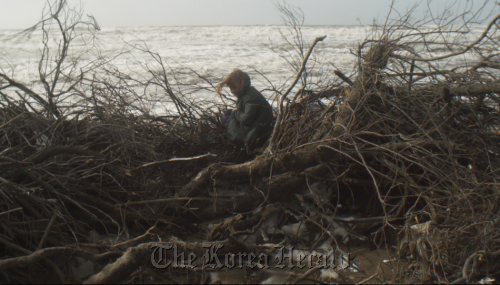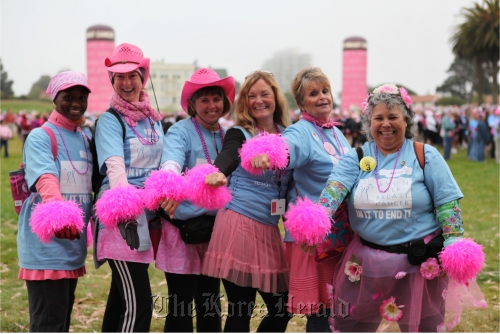Women’s film fest to feature120 films from 30 countries
The Seoul-based women’s film festival is back, with its line-up ever so conscious of the world’s turbulent modern history.
From the breast cancer campaign to contemporary racism to women’s sexuality, this year’s IWFFIS (International Women’s Film Festival in Seoul) is filled with diverse themes and socially conscious issues that have been affecting the lives of women worldwide.
“There was the 2011 Tohoku earthquake and tsunami, the mass demonstrations on Wall Street, and the Jasmine revolution,” this year’s programmer Hong So-in said during a press conference held in Seoul, Tuesday.
“We tried to examine how these contemporary events have affected the lives of women worldwide through the films we chose to showcase for this year’s festival.”
A total of 120 films from 30 countries will be screened this year, including shorts, documentaries and films made by migrant women living in Korea. Two special sections have been created this year to showcase films by women directors from Japan and Mexico.
The Seoul-based women’s film festival is back, with its line-up ever so conscious of the world’s turbulent modern history.
From the breast cancer campaign to contemporary racism to women’s sexuality, this year’s IWFFIS (International Women’s Film Festival in Seoul) is filled with diverse themes and socially conscious issues that have been affecting the lives of women worldwide.
“There was the 2011 Tohoku earthquake and tsunami, the mass demonstrations on Wall Street, and the Jasmine revolution,” this year’s programmer Hong So-in said during a press conference held in Seoul, Tuesday.
“We tried to examine how these contemporary events have affected the lives of women worldwide through the films we chose to showcase for this year’s festival.”
A total of 120 films from 30 countries will be screened this year, including shorts, documentaries and films made by migrant women living in Korea. Two special sections have been created this year to showcase films by women directors from Japan and Mexico.

This year’s opener is Argentinean-born director Paula Markovitch’s autobiographical drama, “The Prize.” The 61st Berlinale-featured film deals with the story of a young mother and her infant daughter living under the repressive Argentinean dictatorship.
“Selecting the opener took us a while,” said IWFFIS director Lee Hye-kyung. “The opener deals with Argentina’s history from a little girl’s perspective.”
In its New Currents section, Canadian filmmaker Lea Pool’s 2011 controversial documentary “Pink Ribbons Inc.” is considered a must-see. Delving into the industry and disturbing “culture” surrounding breast cancer, the film is an incisive expose on the rise of corporate involvement in its campaigns.

American director Barbara Hammer, on the other hand, shares her own experience battling ovarian cancer in her film “A Horse is Not a Metaphor.” The experimental film, which is also featured in IWFFIS’s New Currents section, mixes Hammer’s fights with cancer with her visions of horseback riding and swimming in rivers.
Japanese director Hitomi Kamanaka’s 2010 documentary “Ashes to Honey,” which deals with the global nuclear issue, is included in the line up for the Polemics section. The film takes place on Japan’s remote island named Iwai-shima in Yamaguchi prefecture, where its residents have been fighting the construction of a nuclear power plant for the last 30 years or so.
The section also includes two Korean films about the 2011 layoffs at Hanjin Heavy Industries and Construction, as well as the “Hope Bus Campaign for World without Layoffs.”
While director Park Sung-mi’s animated film “Bus, A Love Story” portrays the people involved with the Hope Bus campaign, Lee Soo-jung’s documentary “Jinsuk & Me” pivots around the case of labor activist Kim Jin-suk, who famously staged a sit-in atop a giant tower crane at a shipyard to protest layoffs by Hanjin.
For commercial film fans, French director Luc Besson’s “The Lady,” which is a biopic of Aung San Suu Kyi, will be screened.
Meanwhile, a section titled “Queer Rainbow” features a total of 10 films that deal with the issue of homosexuality and rights in different countries, including France, Italy, Japan, the U.K, and South Africa.
This year’s IWFFIS has one competition section, featuring 17 shorts from many different countries including Japan, Thailand, Korea, India, Iran, Singapore and Taiwan. The nominated films were chosen from a total of 344 submitted for consideration. The films deal with various women’s issues in the contemporary world, including poverty, relationships, female genital mutilation, and the lives of elderly women. Korean student director Kim Souk-young’s “Anesthesia” is included among the 17 shorts vying for one of the four prizes. A true-case inspired account of a woman raped by a doctor while under anesthesia, the film was featured at this year’s Berlinale as well.
The film festival kicks off on April 19 and runs until April 26 at various venues in Seoul, including Shinchon Artreon theater, Korean Film Archive, CGV Songpa, and Ewha Womans University.
For tickets and information, visit http://www.wffis.or.kr, or call (02) 583-3598.
By Claire Lee (dyc@heraldcorp.com)


![[AtoZ into Korean mind] Humor in Korea: Navigating the line between what's funny and not](http://res.heraldm.com/phpwas/restmb_idxmake.php?idx=644&simg=/content/image/2024/04/22/20240422050642_0.jpg&u=)
![[Exclusive] Korean military set to ban iPhones over 'security' concerns](http://res.heraldm.com/phpwas/restmb_idxmake.php?idx=644&simg=/content/image/2024/04/23/20240423050599_0.jpg&u=20240423183955)



![[Graphic News] 77% of young Koreans still financially dependent](http://res.heraldm.com/phpwas/restmb_idxmake.php?idx=644&simg=/content/image/2024/04/22/20240422050762_0.gif&u=)
![[Herald Interview] Why Toss invited hackers to penetrate its system](http://res.heraldm.com/phpwas/restmb_idxmake.php?idx=644&simg=/content/image/2024/04/22/20240422050569_0.jpg&u=20240422150649)





![[Exclusive] Korean military to ban iPhones over security issues](http://res.heraldm.com/phpwas/restmb_idxmake.php?idx=652&simg=/content/image/2024/04/23/20240423050599_0.jpg&u=20240423183955)



![[Today’s K-pop] Ateez confirms US tour details](http://res.heraldm.com/phpwas/restmb_idxmake.php?idx=642&simg=/content/image/2024/04/23/20240423050700_0.jpg&u=)